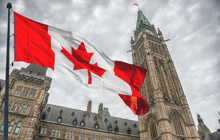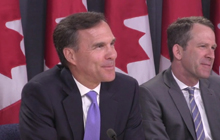Remember who the tax system is for

Francois Boileau, Canada’s taxpayers ombudsperson, responds to the article, The forgotten project of tax reform, by François Brouard and Bertrand Lemieux
Letter to the editor response to the article The forgotten project of tax reform, by François Brouard and Bertrand Lemieux.
As the taxpayers’ ombudsperson, I read with interest the article “The forgotten project of tax reform.” I agree that the need for tax reform is a nonpartisan issue. I would also point out the positive impact that tax reform could have for everyday taxpayers.
For example, a simpler tax system would help the public better understand their filing obligations. The Canada Revenue Agency (CRA) has the difficult task of making complex and lengthy legislation understandable for the average person.
However, as noted in our office’s 2024-2025 annual report, the content the CRA publishes on Canada.ca can sometimes be unclear, unavailable or hard to find. This is in no small part because of the complexity of Canada’s tax system. Streamlining the system would make the task of educating the public about their filing obligations exponentially easier.
If a full overhaul of the tax system is too daunting, introducing automatic tax filing would be an excellent alternative.
Our 2024-2025 annual report also analyzes how simplifying the filing process can increase filing rates and help vulnerable people get the benefits and credits they are legally entitled to.
Introducing an automatic filing system beyond the CRA’s SimpleFile suite of services could remove some of the barriers that the tax system’s complexity creates, and it wouldn’t take a full overhaul of the system to do it.
We have to remember that, fundamentally, tax policies and consequently the law are there to serve Canadians. Whatever changes happen in the future, lawmakers and policy advisors should not forget this.
François Boileau is Canada's taxpayers’ ombudsperson. This letter to the editor was published on July 8, 2025 on Policy Options and is republished here under a Creative Commons licence. We have republished the original article below for your convenience.
FOR more than 50 years, tax reform has been a recurring theme in federal election campaigns. Every party pledges to make the system simpler, fairer, and more modern. Yet the facts show that little has changed.
The last comprehensive review of Canada's tax system was in 1967, with the Royal Commission on Taxation chaired by Kenneth Carter. Since then, every major party has promised to tackle this complex issue, but none have followed through once in power.
The Liberals once again included it in their election platform. But now that they form the new government, the issue no longer seems to be a priority. Neither the throne speech nor recent remarks from the prime minister have mentioned reform.
A look back at the promises
As part of a study on the need to reform Canada's tax system, we examined proposals from the five main parties in the last federal election.
We did not seek to compare all tax-related proposals or analyze specific measures. Instead, we focused on identifying the promises linked to a reform or simplification of the tax system in each platform, along with the mechanisms proposed to achieve these goals.
Let us begin with the Liberal Party of Canada.
In its Canada Strong platform, tax fairness and system reform were grouped under the theme of “Build,” with ambitious measures such as:
- Establishing a panel of corporate tax experts to review the entire Canadian corporate tax system, guided by the principles of fairness, simplicity, transparency, sustainability and competitiveness;
- Working with European and G7 countries to advance international tax rules aligned with the OECD’s proposals for consistency and fairness.
We need more than cosmetic changes
The promise was clear: reform the tax system to modernize and mobilize revenues to finance social priorities. But so far there is little evidence such a reform is underway.
Key questions remain. Does the government intend to review and reform the tax system? If so, what will be the mandate and scope, and will it lead to real reform or superficial adjustments?
Over the years, a number of legislative changes have affected the tax system. Some, like the proposed increase in the capital gains inclusion rate, were never implemented. (That increase was recently cancelled by Mark Carney.)
Many changes have been piecemeal. What is needed now is a comprehensive approach to ensure the tax system is coherent and aligned with today’s economic realities.
A cross-party issue
It is understandable the government is concentrating on immediate crises that require the full attention of decision-makers: housing, inflation, tariffs imposed by the American president and national security. These are legitimate priorities, but they must not overshadow the importance of structural tax reform.
And if there is one issue that could unite the minority government with opposition parties, it is the tax system. Despite differences in policy approach, all major parties agree it needs an overhaul.
Our study found that all the major political parties included commitments in their platforms to make the tax system fairer and more equitable. Some also proposed ideas to simplify it for taxpayers.
Even with a minority Liberal government, there appears to be cross-party support for a broad review of the tax system.
The watchwords: simplicity and fairness
The Conservative Party of Canada proposed a task force, including farmers, entrepreneurs, and workers, to develop a simpler, fairer tax system.
The Bloc Québécois suggested simplifying federal programs, allowing Quebec to administer a single tax return, and reducing administrative duplication.
The New Democratic Party believes that a rebalancing of the system is necessary to tax wealthier taxpayers more and reduce the tax burden on working people.
The Green Party of Canada proposed a wealth tax (on assets of $10 million or more) and the establishment of a permanent independent tax commission to evaluate fairness.
Despite ideological differences, all parties recognize the need for an in-depth review.
Why keep the pressure on
Tax reform is not just a technical exercise for experts. It has concrete effects on the daily lives of taxpayers, on the resources available to finance public services, and on equity between individuals, regions and sectors.
Neglecting reform means letting inequalities deepen and delaying updates to a system designed for a different economic, social and international era.
The coming months will be a test of the government's intentions. Tax reform requires political will and pressure from opposition parties, experts and civil society.
Opposition parties, whose platforms included similar reform goals, could use the power of their critical influence to push the government into action.
A window for action
The Liberal government still has time to act. But the longer it waits, the more likely it is that the promise be added to the growing pile of other unfulfilled pledges for reform.
Simplifying the system, reinforcing fairness, and modernizing corporate taxation would help reposition Canada in relation to the U.S., and bolster trust in public institutions.
Simplifying the system, reinforcing fairness, modernizing corporate taxation: these objectives can support Canada's repositioning vis-à-vis the United States, and enhance the legitimacy of public institutions.
Postponing reform risks worsening the system’s flaws and eroding public confidence.
In a volatile geopolitical environment, it will also be important to advance fair and consistent international tax rules — an area where Canada has already pledged to lead.
The parties agree, at least in part, on the need for reform. Will they make it a real issue in Parliament? The actions of all parties — not just the government — will shape whether tax reform moves forward or fades away once again.
François Brouard, DBA, FCPA, FCA is professor of taxation at the Sprott School of Business, Carleton University and founder of the Professional Accounting Research Group (PARG). Bertrand Lemieux, MBA, M.Fisc, MSc, CPA (auditor), CPA(US) is a doctoral candidate in management and a lecturer in taxation at the Sprott School of Business, Carleton University, and a member of the Professional Accounting Research Group (PARG). This article first appeared on Policy Options and is republished here under a Creative Commons licence.









(0) Comments